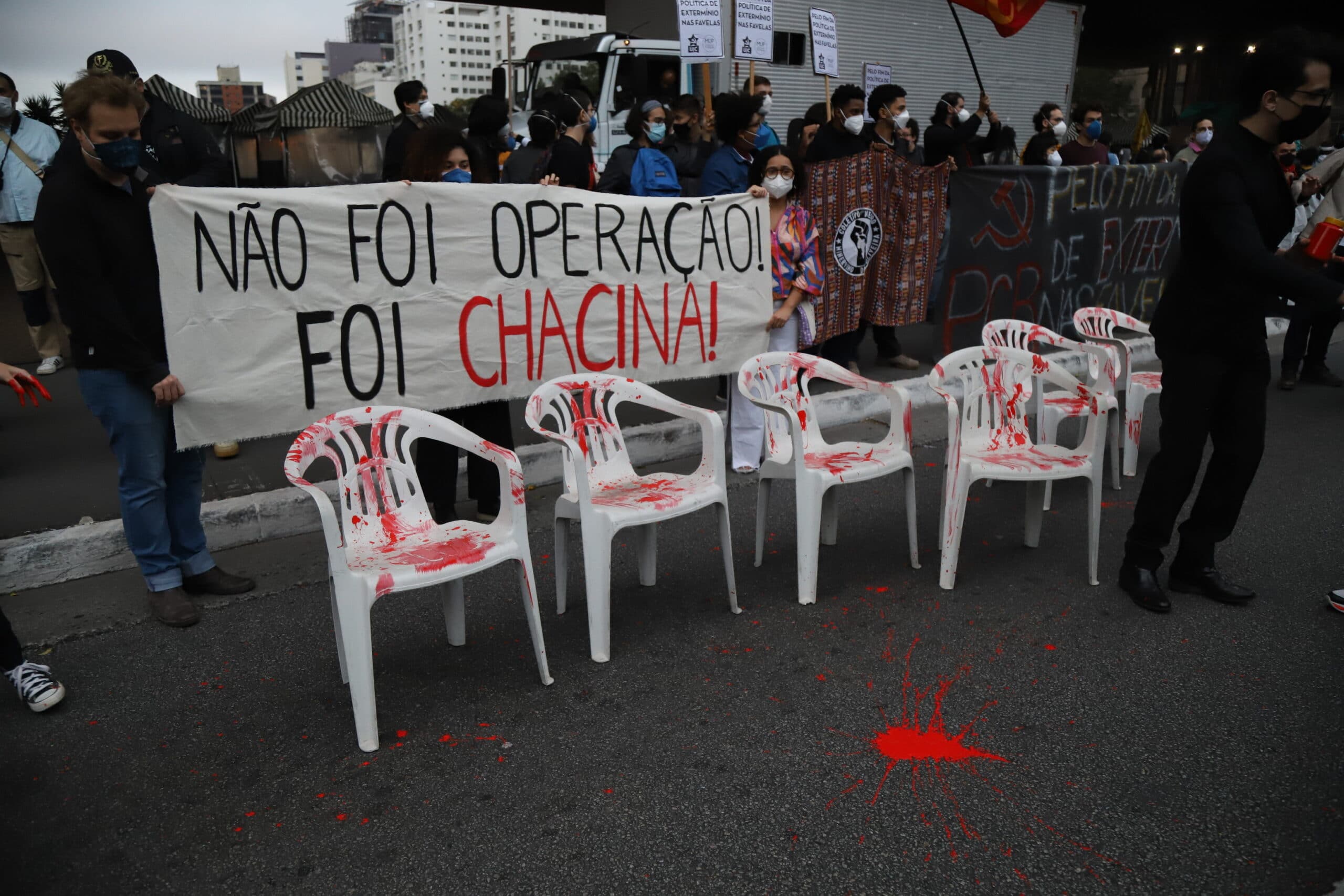Supreme Federal Court could force RJ to create a plan to reduce police lethality
In an online plenary session, starting on Friday (21), the Supreme Federal Court will review a request pertaining to the ADPF of the Favelas injunction (claim of non-compliance with a fundamental precept) which aims to contain violent actions by the Rio de Janeiro police during the pandemic
 Manifestantes pintam de vermelho quatro cadeiras simulando sangue. Atrás, uma faixa diz "Não foi operação foi chacina".
Manifestantes pintam de vermelho quatro cadeiras simulando sangue. Atrás, uma faixa diz "Não foi operação foi chacina".
The online plenary session of the Supreme Federal Court (STF) to rule on an appeal presented by the PSB (Brazilian Socialist Party) and by NGOs and social movements that participate in the Claim for Non-Compliance with a Fundamental Precept 635, more commonly known as the ADPF of the Favelas starts on Friday (21). At this trial, organisations will call for the state of Rio de Janeiro to present a plan to reduce police lethality.
The appeal by the organisations refers to precautionary decisions taken by the STF in August 2020. At that time, the plenary session conceded important measures like vetoing the use of helicopters as a position to fire from, restricting police operations near schools and hospitals, preserving the evidence at the crime scene and preventing the removal of bodies for forensic investigation. However, there was not a large enough majority of ministers to force the state of Rio de Janeiro to set up a plan to reduce police lethality and control rights violations by security forces in the city of Rio.
According to Djefferson Amadeus, Coordinator at IDPN (Institute for the Defence of the Black Population) and a lawyer at MNU (Black Unified Movement), who is an amici curiae on the case, the appeal calls for clarification regarding contradictions in the previous ruling regarding the request for a plan to reduce lethality.
Read more
“Ministers provided the justification that there was no need for the urgent attention of the STF regarding this request because in 2017 the Inter-American Court of Human Rights issued an order, obliging the state of Rio de Janeiro to put together a plan.” Amadeus explained. “But, as the Rio de Janeiro government never presented this document, the STF must act to reinforce the need for the state to comply with the decision.” He added.
According to the lawyer, STF ruling makes it possible for the request to be approved. Recently the Court obliged federal government to set out a plan for tackling Covid-19 among indigenous people.
After Edson Fachin ´s vote, the other ministers will have until 28 May to cast their votes, unless someone requests to see documents pertaining to the case and suspends the session.
Rio de Janeiro is the state with the highest rate of police lethality, according to data from the Brazilian Forum of Public Security. In 2018, 1, 534 people died in police interventions, a rate of 8.9 to every 100 thousand inhabitants. In comparative terms, the second state in the ranking is Pará with 672 deaths — 7.9 to every 100 thousand inhabitants.
Definition of exceptional circumstances
In the same trial, organisations are requesting that the STF limit the concept of ´exceptional circumstances´ for carrying out police operations. In the first injunction about the Favela ADPF, in June 2020, Minister Fachin established that new operations would only happen “under absolutely exceptional circumstances, duly justified in writing by the relevant authority and communicated immediately to the Public Prosecutor´s Office”.
“The state of Rio has been trying to broaden the concept of exceptional circumstances in order to justify violent actions which terrorise those living in the favelas and on the peripheries, like the one that caused the deaths of 29 people in Jacarezinho.” Explained Shyrlei Rosendo, at Redes da Maré, another organisation that has signed the appeal to the STF. “In our request, we want the Supreme Court to define this concept so that the Rio authorities can be held accountable for flagrant infringements of the veto and for carrying out police operations during the pandemic.” She concluded.
According to a technical note produced by researchers at GENI (Research Group on New Illegalism), at the Federal Fluminense University, police operations must be limited to immediate, concrete life-threatening circumstances, like armed conflicts between factions or kidnappings happening inside the favelas.
ADPF of the Favelas
For the first time, NGOs, collectives and social movements linked to the favelas and the mothers of victims of police actions are suing the state of Rio de Janeiro for its racist security policy.
ADPF 635 (Claim of Non-Compliance with a Fundamental Precept), known as the “ADPF das Favelas” is an action proposed by the PSB (Brazilian Socialist Party) and is the collective work of the Public Defender’s Office in the state of Rio de Janeiro, Educafro, Global Justice, Redes da Maré, Conectas Human Rights, Movimento Negro Unificado, Iser, IDMJR, Papo Reto Collective, Fala Akari Collective, Rede de Comunidades e Movimento contra a Violência (Community and Movement Network against Violence), Mães de Manguinhos (Mothers of Manguinhos), all organisations that are recognised as amici curiae on the case.
The action calls for all grave violations arising from the public security policy in the state of Rio de Janeiro against the poor, black populations in peripheral regions and in the favelas, to be recognised and rectified.






